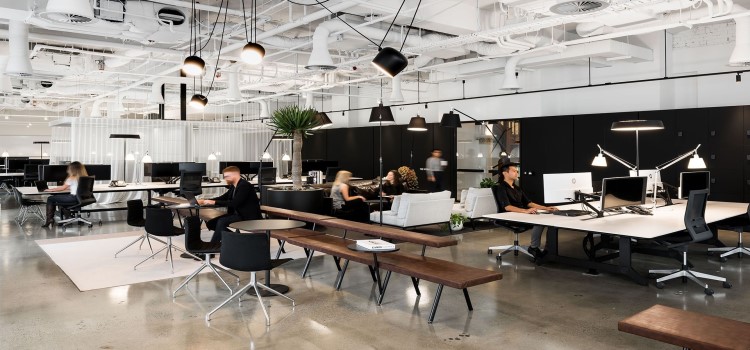
Co-Working Space Market by Business Type (Conventional Co-working, Professional Co-working, and Others), by Business Model (Sub-Lease Model, Revenue Sharing Model, and Owner-Operator Model), and by End User (Independent Professionals, Startup Teams, and Small and Medium Sized Enterprises) – Global Opportunity Analysis and Industry Forecast 2024-2030
Industry: Construction & Manufacturing | Publish Date: 22-Apr-2024 | No of Pages: 225 | No. of Tables: 156 | No. of Figures: 128 | Format: PDF | Report Code : N/A
Market Overview
The Co-Working Space Market size was valued at USD 10.81 billion in 2023, and is predicted to reach USD 36.92 billion by 2030, with a CAGR of 19.10% from 2024 to 2030.
Co-working space represents a dynamic and adaptable solution to the evolving needs of businesses. These shared work environments offer flexibility in lease terms and space requirements, appealing particularly to startups and small enterprises seeking to avoid the upfront costs associated with traditional offices. The communal atmosphere encourages networking and collaboration among professionals from diverse fields, fostering innovation and creativity. Equipped with modern amenities and strategically located, co-working spaces provide cost-effective, scalable, and accessible alternatives for companies seeking a central presence without the constraints of long-term leases. The industry has experienced significant growth as businesses recognize the benefits of this model, embracing the collaborative opportunities and resource-sharing inherent in co-working spaces.
Rising number of startups across the globe drives the market growth
The co-working space market is driven by the thriving global startup sector. These shared work environments cater to the specific needs of startups, offering flexibility and cost-effectiveness. The collaborative nature of co-working spaces, coupled with modern amenities, aligns well with the entrepreneurial spirit, boosting networking and innovation.
For instance, as per the latest report published by the Centre for Entrepreneurs business start-up data, around 800 thousand new start-ups started in the UK in 2022. The substantial increase in startups globally is playing a pivotal role in propelling the growth of the co-working space market.
As startups seek agile and adaptable solutions, the co-working model provides an ideal fit, allowing them to scale without the constraints of traditional leases. In essence, the robust expansion of the startup sector is a driving force behind the upward trajectory of the co-working space market.
Blockchain Technology Revolutionizing Coworking Spaces
As the demand for coworking spaces continues its upward trajectory, the imperative for efficient management and transparent operations becomes increasingly evident. In response to these evolving needs, blockchain technology emerges as a transformative force, offering a plethora of advantages that redefine the coworking landscape.
A notable example of blockchain's integration into the coworking sector is evident in industry giant WeWork's acceptance of select cryptocurrencies as payment for its services. Through strategic partnerships with BitPay and Coinbase, WeWork has expanded its payment options to include Bitcoin, Ethereum, USD Coin, Paxos, and other cryptocurrencies, signaling a significant shift towards blockchain adoption within the flexible workspace industry.
Blockchain technology, renowned for its intrinsic features of transparency, security, and decentralization, presents a compelling solution to many of the challenges inherent in coworking spaces. From streamlining space bookings and scheduling processes to ensuring transparent billing and payment systems, blockchain offers a robust framework for enhancing operational efficiency and trust within coworking ecosystems.
Moreover, the application of blockchain extends beyond operational optimizations to encompass broader coworking-operator processes such as procurement and membership agreements. By leveraging blockchain-based tools, coworking operators can establish more secure, efficient, and cost-effective systems that enhance digital visibility and facilitate smoother interactions among stakeholders.
Hybrid Working Models to Increase Coworking Spaces Market Expansion
The global growth of the coworking space market is being driven by the increasing adoption of hybrid working models worldwide. As organizations and employees embrace hybrid work arrangements that blend remote work with in-office attendance, the demand for flexible and collaborative workspace solutions provided by coworking spaces is on the rise. Employers across the globe are recognizing the benefits of hybrid work, including increased flexibility and improved work-life balance for their employees.
This shift towards hybrid work is reshaping the traditional dynamics of work and creating a need for workspaces that can accommodate diverse working styles and preferences. A study conducted by Gartner in 2023 highlights the prevalence of the hybrid work trend, in the United States, with 51% of knowledge workers in the U.S. having embraced hybrid work arrangements, while an additional 20% have opted for fully remote work setups.
This significant adoption of hybrid and remote work translates into a combined 71% of the U.S. workforce engaging in fully remote or hybrid work by 2023. By offering dynamic solutions that align with the evolving needs of hybrid workers, coworking spaces play a pivotal role in shaping the future of work.
Lack of Exclusivity poses significant challenge for the coworking spaces industry
A significant factor restraining the growth of the coworking spaces market is the lack of exclusivity inherent in many coworking environments. Unlike private offices, where businesses can secure dedicated spaces tailored to their specific needs, coworking spaces often offer memberships with unlimited access to communal workspaces for various types of companies.
This lack of exclusivity can result in overcrowded spaces and limited access to amenities such as meeting rooms. Moreover, the open nature of coworking spaces means that individuals and businesses cannot guarantee that they will be working alongside like-minded professionals or within a community that aligns with their goals and values.
Incorporation of Coworking-as-a-Service (CaaS) to Create Opportunities in the Future
A notable trend shaping the future of coworking spaces is the transition from mere physical spaces to comprehensive service offerings, known as Coworking-as-a-Service (CaaS). This evolution recognizes that users now expect more than just a workspace and they seek a suite of additional benefits tailored to their needs. CaaS goes beyond providing flexible workspace and desks as it encompasses a range of perks such as 24-hour keycard access, mentorship programs, and access to venture capital. This holistic approach aims to enhance the user experience and meet the diverse needs of coworking space occupants.
Moreover, CaaS leverages digital technology to streamline operations, offering niche spaces tailored to specific communities, fostering mentorship opportunities, and reducing administrative burdens for users. Additionally, there is a growing emphasis on sustainability within CaaS offerings, aligning with the values of environmentally conscious users.
Europe dominates the co-working space market
The growth of coworking spaces in Europe is propelled by several pivotal factors reflecting the dynamic landscape of innovation, entrepreneurship, and economic progress across the region. A significant catalyst is the rapid expansion of startups, fueled by substantial government investments in innovation and research.
For instance, the commitment of the French government to inject an additional 500 million euros to support the establishment of 500 deeptech startups annually, with the ambitious goal of nurturing 100 unicorns in France by 2030, underscores a strong dedication to leveraging scientific and technological advancements for societal and economic development.
This surge in startups not only fuels the demand for flexible workspaces but also fosters a culture of collaboration and innovation, thereby contributing to the growth of the coworking space market. Furthermore, strategic partnerships and collaborations between real estate developers and coworking space providers have played a pivotal role in driving market expansion.
For instance, in February 2023, infinitSpace, a leading creator of white-label flexible workspaces, partnered with CG Elementum, a prominent German commercial real estate developer. Together, they aim to establish a new flexible workspace brand distinguished by innovative design, cutting-edge technology integration, emphasis on community building, and a strong commitment to robust Environmental, Social, and Governance (ESG) standards. Such collaborations not only enhance the accessibility and quality of coworking spaces but also contribute to the creation of cohesive and sustainable work ecosystems.
Asia-Pacific is expected to show steady growth in the co-working space market
The surge in startups across the Asia Pacific region is further boosting the growth of the co-working space market. According to the government if India, a total of 26,542 new startup was registered in India in 2022, an increase of 32% from 2021. As the startup ecosystem is expanding in this region, entrepreneurs, small businesses, and freelancers are increasingly seeking flexible and cost-effective office solutions, fueling the demand for co-working spaces. These shared work environments provide startups with the flexibility, networking opportunities, and infrastructure they need without the long-term commitments and overhead costs associated with traditional office spaces.
Moreover, the co-working space market in the Asia Pacific is experiencing robust growth, propelled by the increasing launches of co-working spaces due to the rising demand for flexible work environments in the region. The shift in work culture preferences in countries such as India, Japan, and South Korea, with businesses and professionals recognizing the advantages of co-working, such as flexibility and networking opportunities.
For instance, in August 2022, India Accelerator, a Co-working firm, launched a spacious 20,000 sq. ft. facility equipped with 250 seats for co-working space. The company also plans to introduce six additional business centers in Ahmedabad, Pune, Hyderabad, Bangalore, Mumbai, and Gurgaon by the end of 2022. Through this launch, the company aims to provide startups with the benefits of co-working environments in the evolving workplace preferences, contributing to the flourishing co-working space market in the region.
Competitive Landscape
The co-working space market comprises of various companies including International Workplace Group Plc (IWG), WeWork Inc., Vast Coworking group, Mindspace, The Executive Centre, Industrious, Servcorp Limited, Newmark Group, Inc., Impact Hub, Convene Inc, and others. These companies are adopting various strategies such as expansion of business to remain dominant in the co-working space market.
For instance, in February 2024, Convene collaborated with LM Media Worldwide, a company that helps to find hotels for various occasions, aims to enhance Convene’s commitment to being a one-stop-shop for meeting and event planners.
Moreover, in January 2024, WeWork India collaborated with Yardi to launch a space management solution called WeWork Workplace. This software is designed to help large organizations and businesses optimize their office space requirements, providing real-time data analytics to identify and address operational inefficiencies.
Key Market Segments
By Business Type
-
Conventional Co-working
-
Professional Co-working
-
Others
By Business Model
-
Sub-Lease Model
-
Revenue Sharing Model
-
Owner-Operator Model
By End User
-
Independent Professionals
-
Startup Teams
-
Small and Medium Sized Enterprises
-
Large scale enterprises
By Region
-
North America
-
The U.S.
-
Canada
-
Mexico
-
-
Europe
-
The U.K.
-
Germany
-
France
-
Italy
-
Spain
-
Denmark
-
Netherlands
-
Finland
-
Sweden
-
Norway
-
Russia
-
Rest of Europe
-
-
Asia-Pacific
-
China
-
Japan
-
India
-
South Korea
-
Australia
-
Indonesia
-
Singapore
-
Taiwan
-
Thailand
-
Rest of Asia-Pacific
-
-
Rest of the World (RoW)
-
Latin America
-
Middle East
-
Africa
-
REPORT SCOPE AND SEGMENTATION:
|
Parameters |
Details |
|
Market Size in 2023 |
USD 10.81 Billion |
|
Revenue Forecast in 2030 |
USD 36.92 Billion |
|
Growth Rate |
CAGR of 19.10% from 2024 to 2030 |
|
Analysis Period |
2023–2030 |
|
Base Year Considered |
2023 |
|
Forecast Period |
2024–2030 |
|
Market Size Estimation |
Billion (USD) |
|
Growth Factors |
|
|
Countries Covered |
28 |
|
Companies Profiled |
10 |
|
Market Share |
Available for 10 companies |
|
Customization Scope |
Free customization (equivalent up to 80 working hours of analysts) after purchase. Addition or alteration to country, regional, and segment scope. |
|
Pricing and Purchase Options |
Avail customized purchase options to meet your exact research needs. |
KEY PLAYERS
-
International Workplace Group Plc (IWG)
-
WeWork Inc.
-
Vast Coworking group
-
Mindspace
-
The Executive Centre
-
Industrious
-
Servcorp Limited
-
Newmark Group, Inc.
-
Impact Hub
-
Convene Inc.




 Speak to Our Analyst
Speak to Our Analyst


































